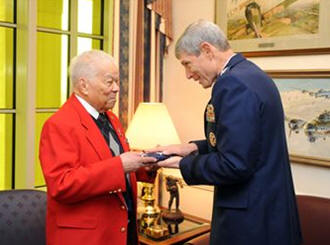|
|||||||||||||||||
|
|
|
|||
|
'Red Tail' Member
Visits The Pentagon By Richard A. Williams |
||||
 |
March 23, 2012 - The Air Force hosted one of the
original Tuskegee Airmen and his family March 16 during
a tour of the Pentagon. Retired Lt. Col. Walter
McCreary, his daughter Stephanie Lynch and grandson
Nicholas Lynch were given a tour of the Air Force Art
Gallery, the Pentagon 9/11 Memorial and the Tuskegee
Airmen exhibit in the Pentagon. McCreary, who is 94, also met with Air Force Chief of Staff Gen. Norton Schwartz, who presented him with a flag that was flown over the Pentagon to commemorate his visit.
A
World War II aerial combat veteran with 89 missions in
the European theater, he spent time as a prisoner of war
in Germany after his P-51 Mustang was hit by
anti-aircraft fire that destroyed its radiator over the
skies of Bucharest, Romania.
McCreary recalled coming to the Pentagon while on active duty in the 1950s when he flew courier missions to deliver classified messages for the then Air Force Security Services from Kelly Air Force Base, Texas. |
|||
| Air Force Chief of Staff Gen. Norton Schwartz presents an American flag that was flown over the Pentagon to retired Lt. Col. Walter McCreary on March 16, 2012. Schwartz hosted McCreary, an original Tuskegee Airman | ||||
|
"I
would land at Bolling Air Force Base, take a water taxi to
the Pentagon, deliver information, take a water taxi back to
Bolling and fly back to San Antonio," he said. "It wasn't as
busy back then and it seems there is a lot more hustle and
bustle going on today."
The
historical displays in the building were impressive, McCreary
said. He said he wished more young people could see them because
he doesn't believe they understand military history.
The
challenge of racial barriers was something he and his fellow
Tuskegee Airmen had to face in the segregated landscape of the
then Army Air Forces but it was a challenge he and his fellow
Airmen undertook.
"As a cadet, we won the battle and were accepted as a cadet," McCreary said. "Racial barriers were the main stumbling block because you never got a chance to prove your ability both educationally and physically because of segregation. You always stayed on 'the other side of the track'." |
||||


